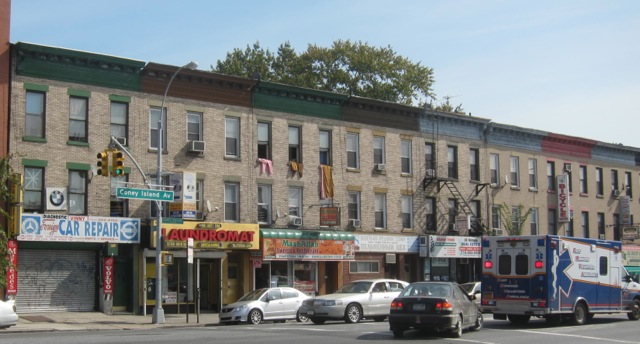Cookie and May and the Rest of Them Too
May was a haggard-looking woman and Cookie her thin pale little daughter. I haven't uttered their names since 1958, and their whereabouts and outcomes are unknown, but they lived two doors away from us on Coney Island Avenue. Sometimes in the night the walls of those apartments seemed to tremble, and neighbors heard the yelling and crying from within. Doors slammed, chairs banged, the air was filled with curses and muffled pleas. In the morning, May would hurry down the street, head down, clasping Cookie's small hand in hers. "He showed up again last night," the neighbors would say. Here's to May and Cookie, and I hope Cookie's life turned out better than its start.
And here's to miserable Mrs. Milici, elbows on a pillow at the window sill, monitoring the happenings on the street with a constant scowl, mother of eleven kids but licensed to scold anyone in sight, readily meddling in Italian-accented English. "I saw your father with a woman the other day," she shouted to me once. "She wasn't your mother...so who?"
Strange question to ask a child. I thought about the earring with the purple stone I'd found on the floor of my father's car, like a tiny star dropped carelessly from the galaxy where laughter may have lived, and I was fine not knowing whose or why or if.
Here's to the old woman who walked the avenue, muttering to herself, looking for coins on the sidewalk or bottles with deposit to redeem. Newly Sunday-schooled, Carol and I tried to befriend her once. We said hello and asked her what her name was. "Leave me alone, ya little bastards!" she replied.
And here's to Harry Nathanson, the grocer, who gave us credit via handwritten IOUs he slipped into the cash register drawer, who trusted and was always paid. He kept a good store: wooden floors, canned goods lined up tidily, milk in glass bottles, dixie cups, bags of Wise potato chips, even a display area where you could vote for Miss Rheingold as often as you liked.
Here's to crabby Joe Gluck as well, who ran the corner candy store, source of sodas and comics and ice cream cones too, a place where you felt filthy rich if you had three nickels in your hand.
And to Mr. Herman, who repaired and sold clocks...a whole store filled with clocks and nothing else, some of them cuckoo or tall stately grandfathers, and Mr. Thorner, whose trade was nails and hardware, I suppose, but who mostly sat outside smoking his cigar.
And Mr. Keating, who might buy ice cream for everyone when the Good Humor truck came by, and Winnie Smith, always walking with her pair of pug-nosed dogs.
And a humble nod to the tailor and his wife, on whose arms were etched the tattooed numbers of a concentration camp.
Here's to Charlotte, the white-haired lady around the corner who always said good morning and along whose chain link fence marigolds grew, and here's to the one who made root beer popsicles and gave them to the children, even though there weren't enough to go around, and I was the kid who missed out. I’ll never forget that injustice.
Here's to Carol's Aunt Marie, who took us in a rowboat once on the lake at Prospect Park, and Charlie-the-butcher, who gave us slices of bologna wrapped in sturdy paper when we came for trick or treat. And here's to our enemy, Francis, the boy who lived near the tailor shop. I don't know why we were at war.
To Ivan, who kissed me quickly on a hot bright day, paused at a storefront, everything glaring and yellow-gold, and we were only little kids, both immediately mortified, and none of that was real, but we were pretty good friends in those days.
Here's to the jump ropers and potsy players, the hide and seekers, the dandelion pickers, the sore losers, dirt bomb hurlers, and the great pretenders who could turn the street into anything we wanted it to be.
Here's to rain on the sidewalk, popsicle stick boats sailing in gutter streams, stoops and rooftops and summer nights. Here's to beauteous strands of spoken Italian, Yiddish accents, Irish grins.
Here's to the people who live there today, new groups of hopefuls finding their way.

